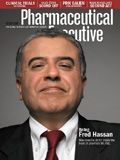Are We Safer Yet?
Pharmaceutical Executive
FDA has just premiered a new newsletter on drug safety. There's just one little problem....
Knowledge not communicated almost invariably is knowledge wasted, and if the information can help better protect and promote the health of our public, the waste is intolerable." So writes FDA Commissioner Andrew von Eschenbach in the first issue of FDA's new Drug Safety Newsletter, which was published last month. The newsletter is one of the steps the agency is taking to respond to the criticisms made last year in the Institute of Medicine's report on drug safety. It's a nice enough newsletter, something the FDA ought to publish, and I'm certain that some people will find it useful. But does it make the public safer?

Patrick Clinton
Does it fulfill its stated goal of helping physicians to make better decisions? That's another question entirely.
If you haven't seen it yet, the newsletter is a 10-page PDF file (it's also available in HTML format) to be found at fda.gov/cder/dsn. It contains brief reviews of safety issues related to four drugs—three postmarket and one new molecular entity—plus links to FDA communications issued between January 1 and June 1.
The review articles mostly look at adverse-event cases reported to FDA. For example, one article provides details on six patients who have experienced severe rashes while taking Cephalon's Provigil (modafinil) for sleep disorders. We learn age, sex, symptoms, how long after taking modafinil the symptoms showed up, and (in a couple of cases) what else the patient was taking.
Another piece looks at two cases of progressive multifocal leukoencephalopathy (PML), a viral infection of the central nervous system, that occurred four to six months after the patients finished a course of rituximab for non-Hodgkins lymphoma. The article includes a detailed description of the course of the disease, autopsy results, and a list of other conditions that might have been related to the development of PML.
It's interesting material and certainly useful to somebody. But for a doctor and patient trying to make a decision about taking or not taking a drug? I don't think so. For practical decision making, you need a different sort of information: How likely is it that the adverse event was actually caused by the drug? How common is the side effect in absolute terms and compared with other treatments or no treatment at all? What are the alternatives to the treatment in question, and what are their comparative risks? What other factors increase or decrease the risk of the adverse event, and how much impact do they have?
And, of course, the newsletter provides none of that. FDA admits as much in its fact sheet on the newsletter. Adverse-event data just don't work that way. That means the newsletter is going to have next to no impact on how doctors and patients make decisions. How could it?
FDA, with the best of intentions, has fallen into the same trap Congress and the media have fallen into so many times. Isolated facts alone don't help you make decisions. For that, you need facts put into context and correctly analyzed. In short, you need knowledge. And as much as we want knowledge about these drugs and their effects, the fact is that we don't currently have it. No knowledge means no improved decision making, no matter how thoroughly we publicize the individual data points.
Andy von Eschenbach had it right: Knowledge not communicated is wasted. But it also works the other way around: Communication without knowledge to communicate is usually wasted too.
Patrick Clinton
Editor-in-chief

FDA Outlines Updated Requirement for Placebo-Controlled Trials in Vaccine Research
May 21st 2025In an article recently published by The New England Journal of Medicine, FDA higher-ups Vinay Prasad, MD, MPH; and Martin A. Makary, MD, MPH, wrote that any new COVID-19 vaccine must now be evaluated in placebo-controlled studies.
Addressing Disparities in Psoriasis Trials: Takeda's Strategies for Inclusivity in Clinical Research
April 14th 2025LaShell Robinson, Head of Global Feasibility and Trial Equity at Takeda, speaks about the company's strategies to engage patients in underrepresented populations in its phase III psoriasis trials.
Beyond the Prescription: Pharma's Role in Digital Health Conversations
April 1st 2025Join us for an insightful conversation with Jennifer Harakal, Head of Regulatory Affairs at Canopy Life Sciences, as we unpack the evolving intersection of social media and healthcare decisions. Discover how pharmaceutical companies can navigate regulatory challenges while meaningfully engaging with consumers in digital spaces. Jennifer shares expert strategies for responsible marketing, working with influencers, and creating educational content that bridges the gap between patients and healthcare providers. A must-listen for pharma marketers looking to build trust and compliance in today's social media landscape.